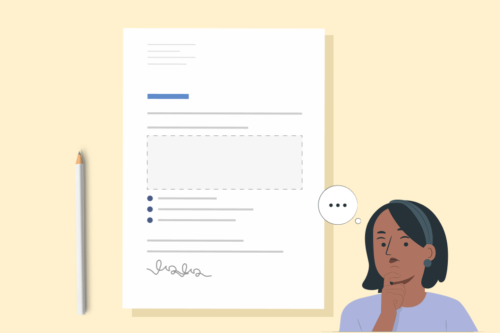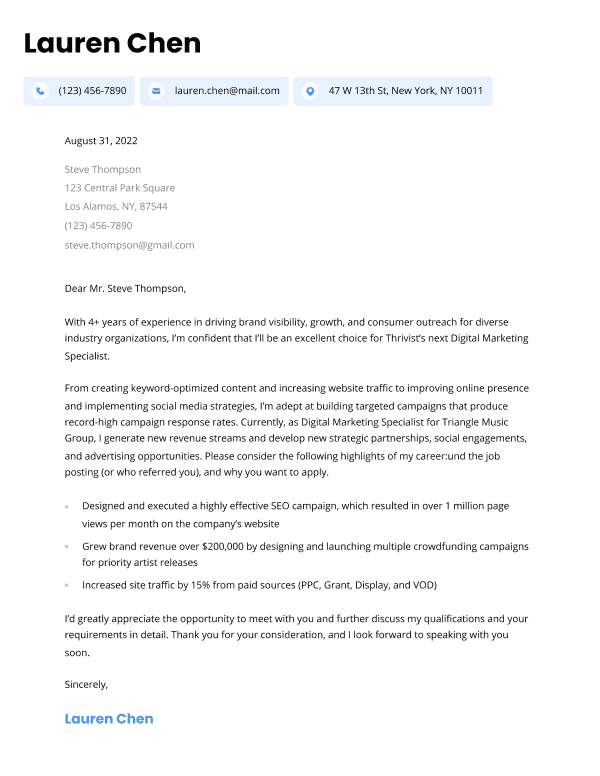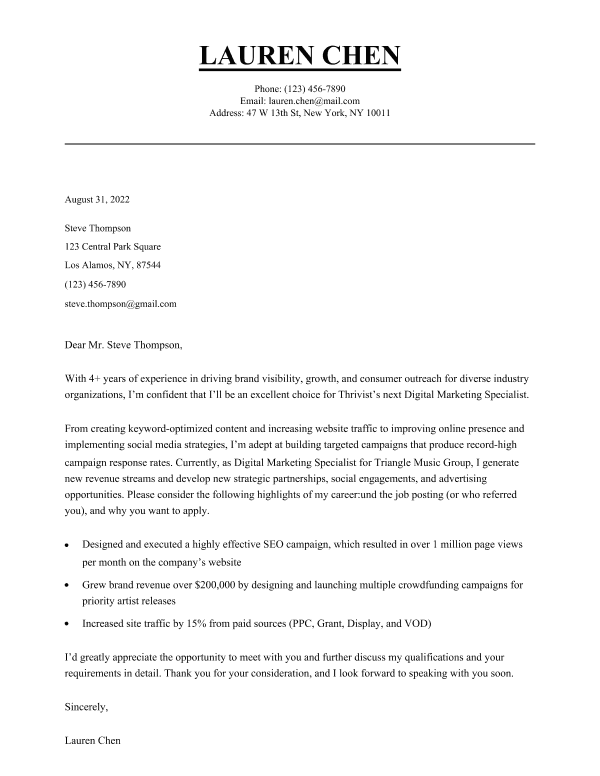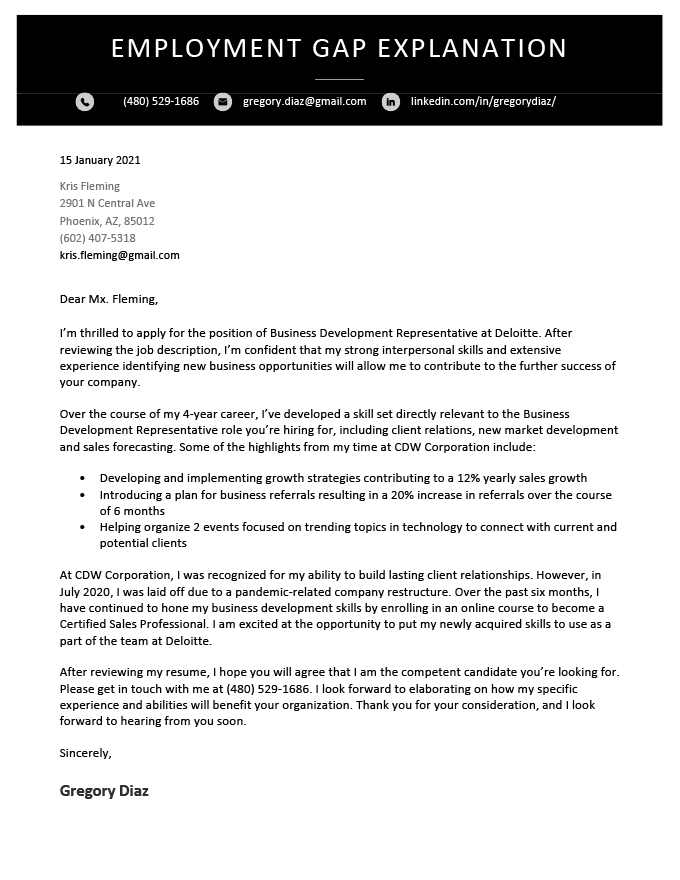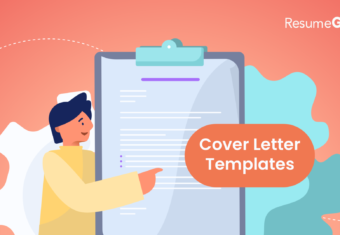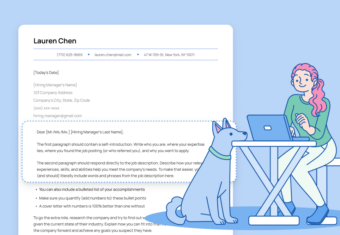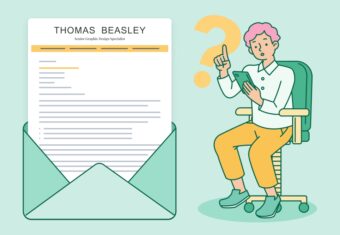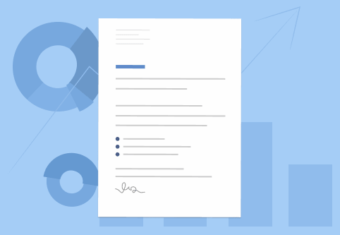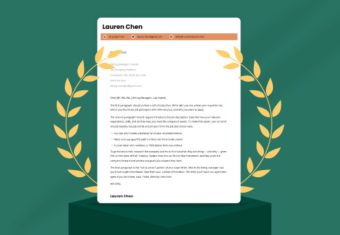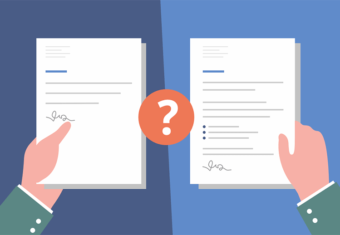Gaps on your resume can raise red flags for employers, but as long as you handle your employment gaps correctly, they won’t ruin your ability to land a job.
In fact, your cover letter is the ideal place to explain your employment gaps because it gives you the opportunity to go into more detail about your work history.
Use the employment gap explanation letter sample and writing tips below to help you convincingly explain an employment gap on your cover letter.
Our free-to-use cover letter builder can make you a cover letter in as little as 5 minutes. Just pick the template you want, and our software will format everything for you.
Employment gap explanation letter sample
Here’s an example of a cover letter that properly explains a gap in the candidate’s employment:
4 tips for explaining a gap in employment on your cover letter
An employment gap doesn’t have to be a dealbreaker. In fact, it can sometimes even work to your benefit.
Follow these four writing tips to turn your resume gap into a compelling reason to hire you.
1. Structure your cover letter correctly
Writing a cover letter with an employment gap is not that different from writing a regular cover letter. It should still focus on highlighting your greatest strengths and the qualities that make you a good candidate.
When you write your cover letter, keep your employment gap explanation brief so as not to make it the primary focus. Here’s how to structure your cover letter to improve your chances of leaving a good first impression on employers:
- Salutation
- Opening paragraph
- First body paragraph
- Second body paragraph (employment gap explanation)
- Closing paragraph
- Sign off
By placing your explanation paragraph further down, you ensure that the first thing the hiring manager sees is the professional accomplishments you’re most proud of, not that you were unemployed for an extended period of time.
2. Focus on the positive
A killer cover letter complements your resume by expanding upon your most impressive achievements. It also gives hiring managers a better idea of who you are as a person, and why you’re a good personality fit for the company.
If you’ve been out of work for some time, chances are you’ve picked up new skills that could be a benefit to your future employer. These should be highlighted in your cover letter along with any work experience you have.
Even if you haven’t been able to actively seek out new experiences due to personal reasons, you can still frame your employment gap in a positive light.
Here is a list of some acceptable reasons for a gap in employment and how to put a positive spin on your gap:
Acceptable reasons for an employment gap
Travel
Last year, I decided to fulfill a life-long dream of travelling around South America. I documented my travels on my blog which quickly gained traction and now receives 20,000 unique visitors a month. I’m confident that the experiences I gained and the writing skills I picked up during this time will help me succeed as a copywriter at Travel + Leisure.
Starting a family
A couple of years ago, I made the decision to take a break from my career as an Event Organizer to focus on raising my son. At the same time, I started a support group for adoptive parents in my community. The group currently consists of 15 active members who meet once a month. We regularly organize events, including for National Adoption Month, and invite experts to speak on adoption-related topics.
Caring for a sick family member
While I was a full-time family caregiver three years ago, I enrolled in an online course to become a Cisco Certified CyberOps Professional to boost my skills as a Cyber Security Engineer.
Laid off
Throughout my time at my last job, my manager, who is also one of my references, consistently praised my initiatives to improve customer satisfaction. However, as the company decided to move in a different direction, my position was eliminated. I’m excited at the opportunity of a new challenge and am confident my passion for customer service combined with my collaboration skills makes me an excellent fit for your company.
Medical issues
For the past ten months, I’ve been undergoing medical treatment. Having made a full recovery, I’m looking forward to going back to work as a Flight Attendant.
Relocation
Last fall I decided to challenge myself by moving from my hometown in Oregon to New York City to explore new job opportunities in the marketing industry. I’ve now settled down in my new home and am ready to pursue my career as a Marketing Coordinator.
3. Avoid going into too much detail
While it’s important to be upfront about employment gaps to avoid coming across as if you’ve got something to hide, there’s no need to divulge every single detail about how you ended up in-between jobs.
Here are a few examples of what should not be included in a cover letter:
- Specifics about personal health issues
- Why you weren’t able to find a job sooner
- Reasons why you were fired from a previous job
Employers are looking for honesty, and a couple of sentences explaining that you’ve been unemployed and are now ready to re-enter the workforce is enough.
Here are some examples of how to explain your employment gap:
@resumegenius Don’t stress, employers are usually understanding of employment gaps! You’re human, be honest and you’ll be fine! #careertiktok #careeradvice #employmentgap #worktok#greenscreenvideo ♬ Aesthetic – Tollan Kim
4. Only bring attention to employment gaps when necessary
Employment gaps can raise red flags for employers if left unexplained. However, there are instances when an explanation isn’t necessary.
Employment gaps like these typically won’t raise questions:
- You have an employment gap that’s several years old – If you took a year off to travel the world seven years ago and have held a job since then, it’s unlikely that you’ll receive questions about it
- You’re a fresh graduate – Don’t worry about having to find a job immediately out of college. It’s common for fresh graduates to spend a few months figuring out where they want to go with their career and applying for jobs
- You’ve been unemployed for less than six months – Up to six months is considered a normal amount of time to be job searching
Hiring managers may still ask you to explain employment gaps on your resume during an interview, but under the above circumstances an employment gap isn’t usually considered to be out of the ordinary.
Click to rate this article
4.5 Average rating


